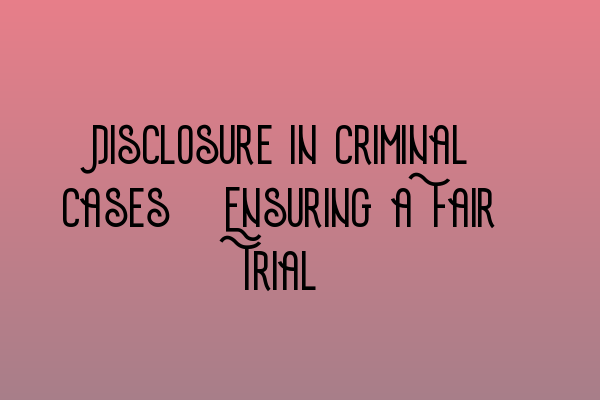Disclosure in Criminal Cases: Ensuring a Fair Trial
Disclosure plays a crucial role in ensuring a fair trial in criminal cases. It refers to the process of sharing relevant information between the prosecution and the defense. The objective of disclosure is to promote transparency, enable the accused to prepare a strong defense, and prevent any surprises in the courtroom. In this article, we will explore the importance of disclosure and its impact on fairness in criminal trials.
The Importance of Disclosure
Disclosure is essential to uphold the principles of justice and fairness. It ensures that both the prosecution and the defense have access to all relevant evidence in a case. This includes not only evidence that supports the prosecution’s case but also evidence that may be favorable to the accused.
Without proper disclosure, the defense may be unaware of crucial information that can significantly impact the outcome of the trial. This can lead to wrongful convictions or an unfair advantage for the prosecution. By providing full and timely disclosure, the prosecution allows the defense to scrutinize the evidence, identify weaknesses, and present a robust defense.
The Role of the Solicitor
A solicitor plays a vital role in the disclosure process. As legal professionals, solicitors are responsible for gathering evidence, reviewing the prosecution’s case, and advising the client on their options. It is the solicitor’s duty to ensure that all relevant information is disclosed to the defense.
Effective communication and collaboration between the solicitor and the client are crucial. The solicitor should actively seek information from the client to uncover any potential evidence that may be relevant to the case. This can include witness statements, CCTV footage, or any other material that may assist in building a strong defense.
In addition, solicitors should be proactive in requesting disclosure from the prosecution. They should carefully review the evidence provided by the prosecution and assess its credibility and relevance. If there are any concerns about incomplete or inadequate disclosure, the solicitor must raise these issues and seek clarification or further evidence.
Ensuring a Fair Trial
Disclosure is fundamental to maintaining a fair trial process. By disclosing all relevant evidence, the prosecution allows the defense to challenge the case effectively. This ensures that the accused has a real opportunity to contest the charges and present their version of events.
Failure to comply with disclosure obligations can compromise the fairness of the trial. It may lead to a breach of the accused’s right to a fair trial under Article 6 of the European Convention on Human Rights. The court may consider such failures when assessing the admissibility and weight of evidence presented by the prosecution.
To ensure a fair trial, solicitors should promptly notify the court of any concerns regarding disclosure. The court can then take appropriate measures to address any issues and safeguard the rights of the accused.
Conclusion
Disclosure is a cornerstone of a fair trial in criminal cases. It is crucial for solicitors to diligently seek disclosure from the prosecution and actively advise the defense on the evidence at hand. By promoting transparency and equality in the criminal justice system, proper disclosure helps ensure that all individuals receive a fair trial.
For further information on SQE exam preparation and related topics, please check out our related articles:
- SQE 1 Practice Exam Questions
- SQE 1 Practice Mocks FLK1 FLK2
- SQE 2 Preparation Courses
- SQE 1 Preparation Courses
- SRA SQE Exam Dates
